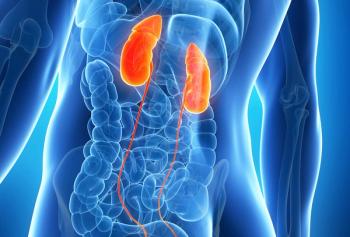
Findings indicate that patients with advanced or metastatic radioactive iodine–refractory differentiated thyroid cancer who received apatinib experienced a prolonged survival benefit vs placebo.

Your AI-Trained Oncology Knowledge Connection!


Findings indicate that patients with advanced or metastatic radioactive iodine–refractory differentiated thyroid cancer who received apatinib experienced a prolonged survival benefit vs placebo.

The TERAVOLT study identified 7 factors associated with increased mortality risk for patients with thoracic malignancies who have contracted COVID-19.

The final analysis of the phase 3 IMmotion151 trial did not reveal a significant improvement in overall survival with atezolizumab plus bevacizumab over sunitinib for previously untreated patients with metastatic renal cell carcinoma.

The CheckMate 648 trial found that using a combination of nivolumab and chemotherapy or nivolumab plus ipilimumab vs chemotherapy alone improved survival in advanced esophageal squamous-cell carcinoma.

OQ011, a topical ointment for hand-foot skin reaction-related pain, yielded positive safety and efficacy in part 1 of 2 phase 2 NOVA-II trial.

Patients who underwent allogeneic hematopoietic cell transplantation using younger matched unrelated donors had a better disease-free survival compared who those who used older matched sibling donors.

Patients with HER2-low metastatic breast cancer achieved clinically meaningful improvement in progression-free survival following treatment with fam-trastuzumab deruxtecan-nxki.

The recommended dose of ceritinib once daily with food demonstrated promising preliminary clinical activity in patients with ALK-positive relapsed/recurrent inflammatory myofibroblastic tumors and anaplastic large cell lymphoma, and certain subsets of relapsed/refractory neuroblastoma.

The FDA has granted IO-202, a LILRB4 checkpoint inhibitor, fast track designation for the treatment of relapsed or refractory acute myeloid leukemia.

The FDA designated the FoundationOne CDx assay as a companion diagnostic for identifying tumors that are microsatellite instability–high and may benefit from pembrolizumab.

A new drug application has been accepted by the FDA for poziotinib in patients with advanced or metastatic non–small cell lung cancer with HER2 exon 20 insertion mutations.

Efficacy of adjuvant mitotane for patients with adrenocortical carcinoma following surgery was presented at 2022 ASCO GU.

Data from a phase 2 trial of atezolizumab with or without radiotherapy showed some antitumor activity in advanced squamous cell carcinoma of the penis, despite failing to meet the primary end point of progression-free survival.

Updated data from the KEYNOTE-564 trial that were reported at 2022 ASCO GU show continuous disease-free survival advantage with pembrolizumab vs placebo as adjuvant therapy for renal cell carcinoma.

Data from the NeoAvAx trial presented at 2022 ASCO GU show potential for neoadjuvant avelumab plus axitinib for high-risk, non-metastatic clear-cell renal cell carcinoma.

Retrospective trial results inform utility of tivozanib in the real-world treatment of renal cell carcinoma.

Better health-related quality of life outcomes were associated with nivolumab and cabozantinib for advanced renal cell carcinoma vs sunitinib.

A surrogate for toxicity and drug exposure, cabozantinib dose reductions were tied to longer durations of time to treatment failure and overall survival for patients with metastatic renal cell carcinoma.

Treatment with cabozantinib in the second line yielded responses in patients with advanced renal cell carcinoma who received immunotherapy in the frontline, regardless of prior regimen.

Subgroups analysis from the CLEAR trial of lenvatinib plus pembrolizumab showed efficacy results were consistent between East Asian patients and the overall study population.

Adding olaparib to durvalumab did not significantly improve progression-free survival for patients with previously untreated, platinum-ineligible metastatic urothelial carcinoma.

Data presented at 2022 ASCO GU of front nivolumab plus cabozantinib for renal cell carcinoma show persistent overall survival benefit versus sunitinib.

New findings indicate that treatment with cabozantinib following failure of immunotherapy proved to be safe and feasible in metastatic renal cell carcinoma.

Rates of progression-free survival at 3- and 4-year landmarks significantly improved with tivozanib vs sorafenib for relapsed or refractory RCC.

Data from the TITAN-RCC trial presented at 2022 ASCO GU showed that certain immune cell–related parameters may be predictive of response to nivolumab/ipilimumab in advanced or metastatic clear cell renal cell carcinoma

Data from cohort H of the EV-103 study highlighted the promising antitumor activity of neoadjuvant enfortumab vedotin for patients with muscle-invasive bladder cancer who are cisplatin-ineligible.

Chung-Han Lee, MD, PhD, spoke about using biomarkers to help predict responses in patients with metastatic renal cell carcinoma treated on the KEYNOTE-146 study.

Research suggests patients with advanced renal cell carcinoma who received neoadjuvant cabozantinib saw reductions in tumor size with no disease progression.

Patients with checkpoint inhibitor–naïve metastatic urothelial cancer appeared to experience promising anti-tumor activity following treatment with second line sacituzumab govitecan and pembrolizumab.

Patients with previously treated metastatic urothelial carcinoma or renal cell carcinoma experienced promising benefit from treatment with niraparib and cabozantinib.